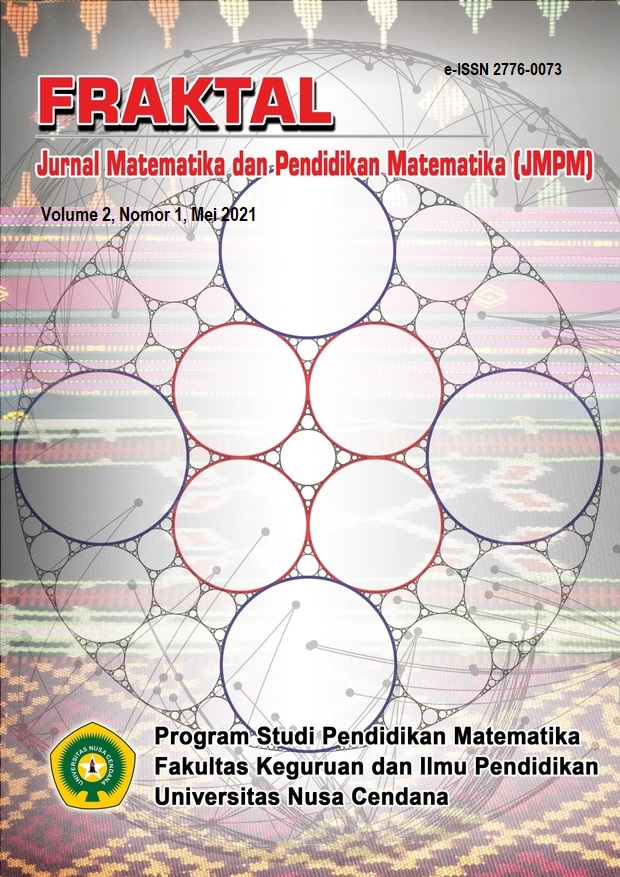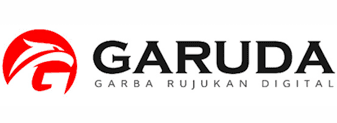Pengembangan Lembar Kerja Peserta Didik (LKPD) Berbasis Problem Solving
Abstract
The purpose of this study is to create and develop teaching materials in the form of Students’ Worksheet (LKPD) Based on Problem Solving in Social Arithmetic Materials. Problem solving steps are used in LKPD, according to the steps according to Polya, namely: (1) understanding the problem; (2) planning; (3) implement the plan; (4) look back or check again. This type of research is Research and Development (RND), using development steps according to Borg & Gall which has been transformed by Sugiyono. The development steps are limited to seven steps. Among them; potential and problems, gathering information, product design, product validation, product improvements, product trials, product revisions. The final percentage of design expert validation is 90%, with very valid categories, 80% with valid categories from material experts, and 95% with very valid categories from linguists. As well as the results of questionnaire responses students get an average of 3.1 with interesting criteria. So it can be concluded that LKPD is feasible to be developed.
Downloads
References
Agustyaningrum, N., Abadi, A. M., Sari, R. N., & Mahmudi, A. (2018). An Analysis of Students’ Error in Solving Abstract Algebra Tasks. Journal of Physics: Conference Series, 1097, 012118. https://doi.org/10.1088/1742-6596/1097/1/012118
Anwar, M. S., Choirudin, C., Ningsih, E. F., Dewi, T., & Maseleno, A. (2019). Developing an Interactive Mathematics Multimedia Learning Based on Ispring Presenter in Increasing Students’ Interest in Learning Mathematics. Al-Jabar : Jurnal Pendidikan Matematika, 10(1), 135–150. https://doi.org/10.24042/ajpm.v10i1.4445
Apri Wahyudi & Choirudin. (2019). Pengembangan Alat Peraga Pembelajaran Matematika Materi Perkalian Berbasis Montessori. Jurnal Manajemen Pendidikan Islam Al-Idarah, 4(2), 33–39.
Budi Halomoan Siregar & Nurhasanah Siregar. (2019). Enhancing The Prospective Teachers’high Order Thinking Skills In Solving Pedagogical Problems. International Journal of Innovative Technology and Exploring Engineering, 8(2), 640–643.
Buyung, B., Sumarli, S., & Rosmaiyadi, R. (2020). Development of problem based learning based on ethnomatematics to support students’ mathematics literacy ability and self-confidence. 030002. https://doi.org/10.1063/5.0017833
Byrne, L. B. (2016). Learner-Centered Teaching Activities for Environmental and Sustainability Studies. Springer.
Chami̇dy, T., Degeng, İ. N. S., & Ulfa, S. (2020). The Effect of Problem Based Learning and Tacit Knowledge on Problem-Solving Skills of Students in Computer Network Practice Course. Journal for the Education of Gifted Young Scientists, 8(2), 691–700. https://doi.org/10.17478/jegys.650400
Choirudin, C., Ningsih, E. F., Anwar, M. S., Choirunnisa, A., & Maseleno, A. (2020). The Development of Mathematical Students Worksheet Based on Islamic Values Using Contextual Approach. International Journal on Emerging Mathematics Education, 3(2), 152–161. https://doi.org/10.12928/ijeme.v3i2.13286
Choirudin Choirudin, Eka Fitria Ningsih, M. Saidun Anwar, Intan Ratna Sari, & Suci Amalia. (2020). Pengembangan Perangkat Pembelajaran Etnomatematika Pada Situs Purbakala Pugung Raharjo. Pi: Mathematics Education Journal, 3(1), 18–27. https://doi.org/10.21067/pmej.v3i1.3755
Erma, E., Koeswanti, H. D., & Giarti, S. (2019). Improving Critical Thinking Skills Using Problem Based Learning on the Media Flash Card. International Journal for Educational and Vocational Studies, 1(6), 619–622. https://doi.org/10.29103/ijevs.v1i6.1671
Gall, M. D., Gall, J. P., & Borg, W. R. (2007). Educational Research: An Introduction. Pearson/Allyn & Bacon.
Hamzah B. Uno. (2015). Model Pembelajaran Menciptakan Proses Belajar Mengajar yang Kreatif dan Efektif. PT Bumi Aksara.
Heryaningsih, N. Y., & Khusna, H. (2018). Development of syntax of intuition-based learning model in solving mathematics problems. Journal of Physics: Conference Series, 948, 012018. https://doi.org/10.1088/1742-6596/948/1/012018
Pupuh Fathurrohman. (2014). Strategi Belajar Mengajar: Strategi Mewujudkan Pembelajaran Bermakna Melalui Pemahaman Konsep Umum dan Islami. Redaksi Refika Aditama.
Serdyukov, P. (2017). Innovation in education: What works, what doesn’t, and what to do about it? Journal of Research in Innovative Teaching & Learning, 10(1), 4–33. https://doi.org/10.1108/JRIT-10-2016-0007
Sugiyono. (2017). Metode Penelitian Kuantitatif, Kualitatif, dan R&D. CV. Alfabeta.
Tambunan, H. (2019). The Effectiveness of the Problem Solving Strategy and the Scientific Approach to Students’ Mathematical Capabilities in High Order Thinking Skills. International Electronic Journal of Mathematics Education, 14(2), 293–302. https://doi.org/10.29333/iejme/5715
Copyright (c) 2021 FRAKTAL: JURNAL MATEMATIKA DAN PENDIDIKAN MATEMATIKA

This work is licensed under a Creative Commons Attribution-NonCommercial-ShareAlike 4.0 International License.
- Hak publikasi atas semua materi naskah jurnal yang diterbitkan/dipublikasikan dalam situs E-Journal Fraktal ini dipegang oleh dewan redaksi dengan sepengetahuan penulis (hak moral tetap milik penulis naskah).
- Ketentuan legal formal untuk akses artikel digital jurnal elektronik ini tunduk pada ketentuan lisensi Creative Commons Attribution-ShareAlike (CC BY-SA), yang berarti Jurnal Fraktal berhak menyimpan, mengalih media/format-kan, mengelola dalam bentuk pangkalan data (database), merawat, dan mempublikasikan artikel tanpa meminta izin dari Penulis selama tetap mencantumkan nama Penulis sebagai pemilik Hak Cipta.
- Naskah yang diterbitkan/dipublikasikan secara cetak dan elektronik bersifat open access untuk tujuan pendidikan, penelitian, dan perpustakaan. Selain tujuan tersebut, dewan redaksi tidak bertanggung jawab atas pelanggaran terhadap hukum hak cipta.

 Choirudin Choirudin(1*)
Choirudin Choirudin(1*)










